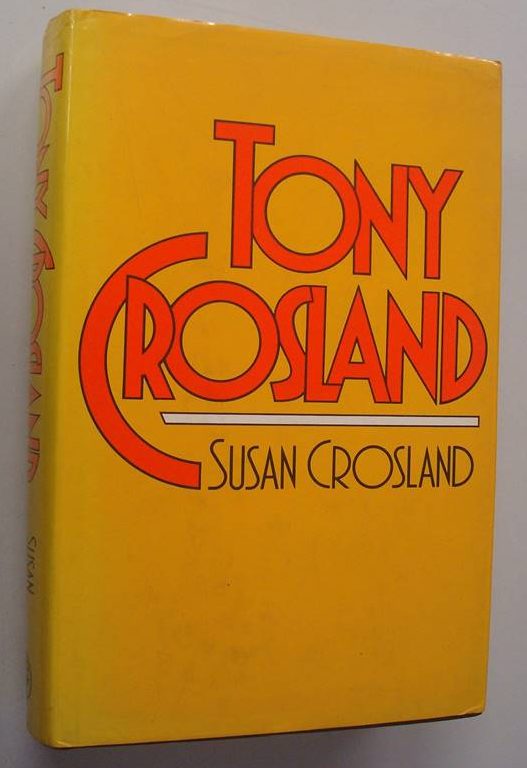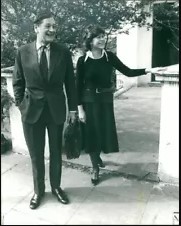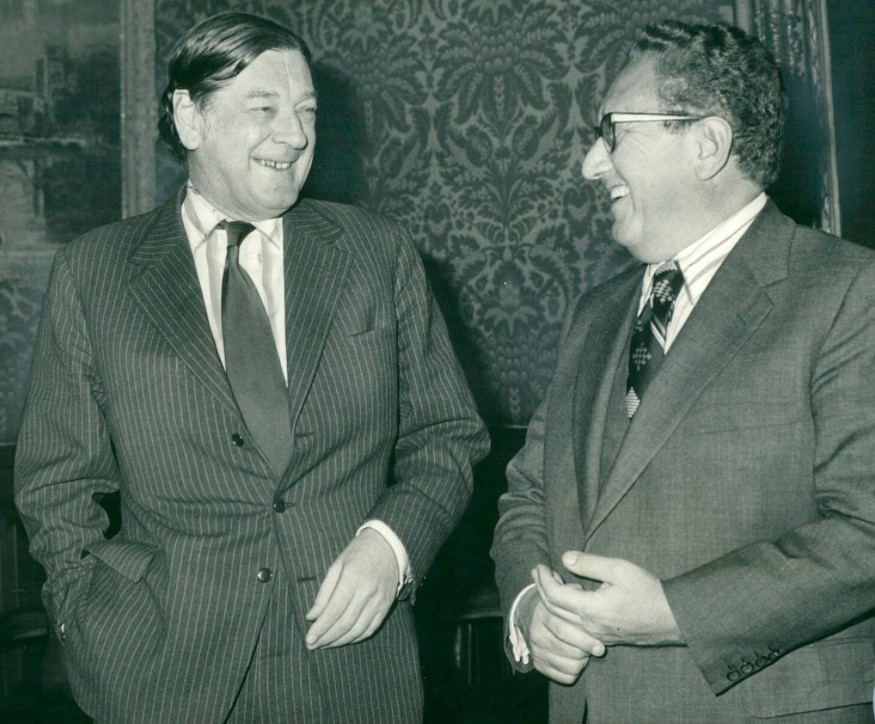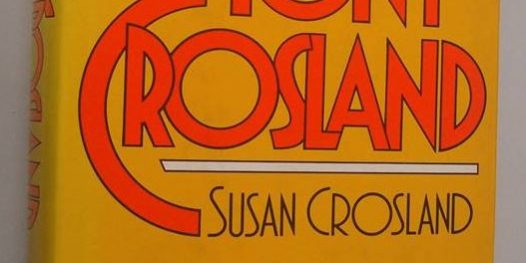Review of Susan Crosland’s biography, Tony Crosland, Jonathon Cape, London, 1982, Labor Leader, Vol. 6, No.4, December 1982, pp. 14-15.

Members of the Labor Party who are not enamoured of the pidgin Marxist rhetoric that often passes for analysis among the Socialist Left would do well to read Susan Crosland’s biography of Anthony Crosland. It is a valuable introduction to the mind and character of her husband.
Anthony Crosland died of a massive stroke in February 1977. At the time he was Foreign Secretary in Jim Callaghan’s Labour government. In a matter of weeks or, at the outside, a few months he was to replace Denis Healey as Chancellor.
This biography steers a careful course between admiration and well-informed critical opinion. In her Preface Susan Crosland states: “I set out to write an unconventional biography in which things happen as they do in real life and the reader is not frog marched through the calendar. I wanted to describe how the characters behaved, talked, reacted to one another, leaving the reader to make any analysis. By presenting Anthony Crosland’s life as a series of phases, describing the people who happened to cross his path, the situations into which he was plunged, Susan Crosland has written a biography in novel form, which captures Crosland’s personality and intellectual toughness.
Anthony Crosland was born into a comfortable family who were adherents to a puritanical Christian sect, the Plymouth Brethren. Crosland’s father. J.B. Crosland, a senior public servant, became No. 2 in the War Office despite his pacifist views. After finishing his schooling, Anthony Crosland rejected his family’s religion, regarding it as narrowly doctrinaire and personally unrewarding.
At age 16, in the Great Depression years and while still at school, Crosland joined the British Labour Party. At school he was a determined iconoclast. Some of his school masters took exception to a Sixth Form essay ‘…Bread for the Masses. Cake for the Few…’
After matriculating, Crosland went up to Oxford University, where he helped found in 1940, the Democratic Socialist Club – in opposition to the communist-dominated, fellow-travelling, Labour Club. One of his political opponents at this time was a student member of the Communist Party and a leader of the Labour Club, Denis Healey. Healey, of course, was to considerably moderate his views in later life.
For most undergraduates at this time, the life of leisurely scholarship was shattered by the War. During World War II Crosland recorded in his diary that, as a member of a parachute brigade, he was able to find meaning to the terms ‘abject terror’ and ‘cold sweat’. Life in the army was a great leveller. Previously having spoken up for the interests of the less fortunate from a comfortable distance, Crosland was now at close quarters.
During the war, and after, Crosland was concerned to know the answer to the question ‘what is the task of democratic Socialists at the present time?’
Slide-Rule Alone
In the post-war years socialists were fond of claiming that, with the nationalisation of leading industries and the involvement of the state in economic planning, the ills of capitalist inequalities and unemployment would gradually be obliterated.
Amongst Fabians, Beatrice and Sidney Webb were cited as examples of planners par excellence. Crosland, however, believed that man could not live by the slide-rule alone.
Pages of Crosland’s 1947 diary record the achievements of the Webbs, but he concluded: “…their considerable indifference to all forms of art or culture, their lack of temptation towards any of the emotional or physical pleasures of life, the consequent priggish puritanism – all this is very unattractive and would, if universally influential, make the Socialist state into the dull functional nightmare which many fear.”
At the 1950 General Election, after several years lecturing in Economics at Trinity College, Oxford University, Crosland was elected to Parliament as the member for South Gloucestershire. He was to survive two elections. At the General Elections of 1955, Crosland was defeated after a redistribution considerably altered the boundaries of his electorate, which forced him to unsuccessfully contest the seat of Southampton West.
In his first period as a parliamentarian, Crosland did not make much impact. Harold Lever, a fellow Labour MP, joked in the house of Commons that the Honourable Member for South Gloucestershire “was a typical example of an academic: if the grandfather clock happened to strike midnight on a sunny afternoon, he would put out the cat, put on his pyjamas and go to bed.” More seriously, Crosland was sometimes drunk in Parliament. This, and his refusal to volunteer for committee work, did not endear Crosland with his colleagues.

Crosland was conscious of the criticism that he was squandering his abilities. In 1956, with the publication of The Future of Socialism, he hoped to dispel this reputation. What Eduard Bernstein was to the German Social Democrats, Crosland hoped to be for British Labor. In his book Crosland attacked the “conservative or indolent-minded people on the Left, finding the contemporary scene too puzzling and unable to mould it into the old familiar categories, [who] are inclined to seek refuge in the slogans and ideas of 50 years ago.”
Crosland defines his critique of socialism as ‘revisionist’, seeking to find modern expression for the ethical values of socialism. In a famous passage he wrote: “We realise that we must guard against romantic or Utopian notions: that hard work and research are virtues: that we must do nothing foolish or impulsive: and that Fabian pamphlets must be diligently studied. We know these things too well. Posthumously, the Webbs have won their battle, and converted a generation to their standards. Now the time has come for a reaction: for a greater emphasis on private life, on freedom and dissent, on culture, beauty, leisure and even frivolity. Total abstinence and a good filing system are not now the right sign-posts to the socialist’s Utopia: or at least, if they are, some of us will fall by the wayside.”
Clause IV
With the powerful backing of Hugh Gaitskell, the Labour Leader, Crosland was able to win selection (by defeating Bill Rodgers) for the marginal electorate of Grimsby, which he won at the 1959 election.
Crosland was back in Parliament, this time determined to survive and make his mark. By 1959 Labour had been out of office for eight years. Factionalism was engulfing the Party.

Gaitskell was under attack within the Party as too conservative a leader. A bitter debate opened up over Clause IV (the part of the British Labour Party’s constitution which referred to the “common ownership of the means of production, distribution and exchange”) and unilateralism (the idea that the British government should unilaterally divest itself of nuclear weapons, hopefully with the consequence that the super powers would be encouraged to cut back on the nuclear arms race). At the 1959 Labour conference unilateralism was narrowly carried as Labour policy. In an emotional speech Gaitskell vowed to reverse this decision and “fight, fight and fight again to save the party we love.” Crosland believed that Gaitskell handled the issues badly. The issue, in Crosland’s mind, was not whether nationalism was a good thing, but whether Clause IV was too narrowly worded in defining the means of achieving socialist ideals. On unilateralism, Crosland wrote to Gaitskell that “some of our difficulties would surely come about in the wash if we weren’t always defending weapons, but were also consistently banging away for multilateral disarmament…” At the 1960 Labor Conference, thanks to the support Gaitskell rallied from the large trade unions, unilateralism was defeated. Clause IV, however, remained Party policy.
In November 1960, Crosland wrote to Gaitskell warning that he had allowed his speeches to sound too conservative: “We must face the fact that the impression has got around – and, alas, I myself largely share it – that the middle class leadership of the party (yourself, Gordon Walker, Soskice, etc.) is leading from an extreme and rather rigid Right-wing position, has no emotional desire to change any major aspect of the society in which we are living. The element of radicalism and discontent, which even the most moderate Left-wing party must possess, seems lacking; even Kennedy sounds more radical than we do.”
A Radical
Crosland always considered himself a radical. In the Preface to The Conservative Enemy (1962) he wrote that:
Unfortunately, conservatism is to be found even inside the Labour Movement. The traditional ‘Right’ (both political and industrial), though magnificent in the defensive battle against unilateralism, still lacks a truly radical appeal and often seems insular, class-oriented, conservative and middle-aged. The traditional ‘Left’ is conservative in a different and more pernicious way, clinging to an outdated semi-Marxist analysis of society in terms of ownership. The ‘New Left’ is at least rebellious and fresh in some of its social criticism; but it largely opts out of the democratic process, either wasting itself in inchoate anger or finding scapegoats (insiders, power-elites, the mass media) for deep seated national failings.
Because Crosland was not backward in saying things like this he gathered a reputation amongst his peers as ‘arrogant’, ‘self-conceited’, ‘too ideological’. No one wins friends by pointing out to the professional socialist or the satisfied pragmatist that they are uttering bankrupt ideas.
But how successful was Crosland in marking out the ideals of socialism? Was revisionism successful in defining the role of a Labour government?
Although Crosland was to concede in later editions of The Future of Socialism and in Socialism Now (1974), that he had been over-optimistic about economic growth in Britain as a vehicle for allowing redistributive measures, though he argued the revisionist definition of socialism still held true. Revisionists, he wrote, “wanted a wider social equality embracing also the distribution of property, the educational system, social-class relationships, power and privilege in industry – indeed all that was enshrined in the age-old socialist dream of a more ‘classless society’. It seemed to us that the fundamental divide between Left and Right, socialists and non-socialists, had always been about the distribution of wealth, power and class status, and would continue to be so until the economic problem of scarcity disappeared and social relations assumed a utopian character.”
This idea of socialism was not set in cement. Socialism was about the means to achieve ethical ends. In different times, different societies, the means would differ also.
In Socialism Now Crosland remarked that “a practicing politician in the Britain of the 1970s, not cerebrating in a monastery cell but living day by day in the thick of things, is not required to answer the stern examiners question: how much equality ultimately? He has plenty of harsh, specific and unmerited inequalities to combat in the next ten years and a decade is my time-span, not eternity.”
Divide and Rule
One of the achievements of Susan Crosland’s biography is her description of Anthony Crosland’s motivations and achievements as a minister in the Wilson and Callaghan governments.
Crosland’s arguments in favour of devaluation of the pound during the first Wilson government, his drive to achieve equality of opportunity in the education system, and his lukewarm and shifting support for entry into the Common Market are all briskly summarised.
Wilson’s capacity for divide and rule and clever manipulation of Cabinet meetings are skillfully sketched in the biography.
As Secretary of State for Education (1965-1967), Crosland embarked on a programme to encourage comprehensive schools and to dismantle the privileges of public (exclusive private) schools. How to convince Cabinet that there was a case for increased education funding was always a problem. There was one course only: “by persuading, arguing, cajoling, exploiting his position, being a bloody nuisance in Cabinet,” could a minister hope to prise open the Treasury’s purse. “Obviously success depends on a whole mixture of factors, a lot of them a matter of luck – your relations with the Chancellor; your standing in the Cabinet; the way the rest of the Cabinet feels towards the education service; whether you can exhaust your colleagues before they exhaust you. It’s an endless tactical battle which requires determination, cunning and occasional unscrupulousness. In an ideal world it would all no doubt be settled by some omniscient central unit, but this is the way it happens in our crude democratic world.”
Although Crosland held senior positions in Labour governments, in Education, the Board of Trade, Local Government and Regional Planning, the Environment and as Foreign Secretary, he never came close to the leadership. In the 1972 contest for Deputy Leader, Crosland came third, scoring 61 votes out of 282. (Ted Short being elected). When Wilson retired in 1976, Crosland stood for the leadership and scored a miserable 17 votes out of 314, coming last in the ballots which elected Callaghan Prime Minister. Despite all of his talents, he was not a machine politician.

In Susan Crosland’s biography she wrote: “Those who came to the Commons excited by The Future of Socialism looked about for its author. They’d been impressed. He identified the issues, then pointed the way. As the world changed, he recharted the course to reach the goal. They’d heard about his leadership (in the Campaign for Democratic Socialism), knew he threw himself wholeheartedly into a cause. The ball was at his feet – to use another metaphor – and they expected him to pick it up. When it came to himself, he didn’t pick up the ball. They wanted to rally round, but he didn’t present himself to be rallied round. They expected to be welcomed with open arms; they never got any open arms from Tony. They were greatly disappointed. Some felt it sharply.” Crosland was not good at cultivating support.
Jenkins
But this does not explain Crosland’s poor showing in the 1976 leadership contest. One reason he gathered so few votes was because Roy Jenkins also ran, attracting votes from the Centre and Right of the Party which might otherwise have gone to Crosland. Jenkins’ supporters launched a campaign against Crosland as someone who had gone ‘soft’ on the Left.
For the first time Susan Crosland has extensively documented the gulf between the Jenkinsite Right (the leaders of whom have subsequently formed the Social Democratic Party) and Crosland.
Between 1970 and 1976 the British Labour Party divided over entry into the European Economic Community. Crosland, although an early advocate, became unenthusiastic about entry, whereas the Jenkins group were religious in their conviction that Britain should join. In Jack Jones phrase, they saw Europe through claret spattered spectacles. Because Crosland deserted the pro-Europe element of the Party, the Jenkinsites caucused to drop Crosland from the Shadow Cabinet in the 1971 ballot. Crosland fell from his previous place, third, to eighth.
Crosland was unimpressed with Jenkins’ warnings throughout the 1970s that the Labour Party was giving way too much to the far Left: “Intense irritation was felt, Tony said, by those in the Party who were attending Committee meetings each week – in his own case, nine a week – to fight against the Left getting its way, while Roy stood on the sidelines and wrote elegant biographical pieces for The Times for a fat fee.”
During 1976 and early 1977 Crosland fought within the Cabinet, of which he was now Foreign Secretary, for a change in direction of economic policy. Morale within the party had slumped and the government seemed to lack either vision or direction. Susan Crosland’s description of the debates and divisions in Cabinet over spending cuts demanded by the International Monetary Fund in 1976, and Crosland’s robust arguments against the policy, is the highlight of the book.
In 1976 Crosland delivered his ‘Equality in Hard Times’ speech, as the John Lewis Memorial Lecture: “What could be advanced in the context of reduced economic growth and public spending?” was the question he sought to answer. Crosland advanced six ideas: industrial democracy, social equality, fairer taxation, priorities in public spending, a wider sharing of political power – devolution and renewed internationalism. In a short speech none of those ideas were developed at any length.
On the weekend before he died Crosland and Roy Hattersley discussed the need for a new book which would consider the future of socialism: “‘we have got to keep making the point’, Tony said to him, ‘that the far Left are not the only people who can claim a socialist theory while the rest of us are thought to be mere pragmatists and administrators’. The distinction he made within the Party was between the radical thinkers and what he called the ameliorators of the Right. ‘It’s not enough to disagree with the Marxists et. al. The Centre must remember and keep reminding people that we are ideologists too’.” Pragmatism without ethical ideals is not worthwhile.
Susan Crosland’s biography will not be the definite study of Anthony Crosland’s intellectual or ministerial achievements. Susan Crosland, for example, admits that her husband “did not discuss foreign policy with me. Personalities, yes. Negotiations, no.” But she has not attempted to write the definitive work, if ever one could be written. She has written a sensitive biography about a Labour MP who saw values and ideals as central to politics. As Crosland liked to say, “I daresay thinking is a minority occupation among ministers, though I’ve always found it helpful.”
Postscript (2015)
Crosland was one of the great thinkers and personalities of the British Labour Party, of a kind that arguably never emerged in Australia. In the late 1970s, he was a hero to the intellectual Labor Right in Australia. His Fabian pamphlet Social Democracy in Europe was widely circulated. He inspired Bob Carr to write a pamphlet Social Democracy and Australian Labor (1977), which was an attempt to provide intellectual ballast and a framework for the moderates in the ALP.






